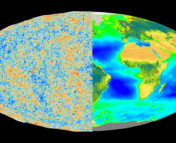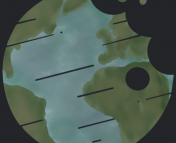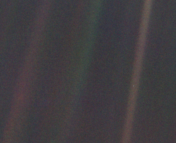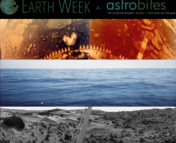Welcome to the first post for our second Earth Week at Astrobites! In today’s post, we introduce our speakers and supporters for Earth Week x Astrobites 2023, with a focus on communicating climate change. We prompted each to tell us briefly about their path and their work, specifically tying into our theme for 2023: how do I as a [student / educator / science enthusiast] talk to people about climate change?
Check out our Earth Week x Astrobites 2023 page for information about our events and posts throughout the week!
Dr. Shannon Schmoll: engagement beyond the dome
Dr. Schmoll will be a panelist in our discussion “How do I as a [student/scientist/educator/science enthusiast] talk to people about climate change effectively?” on Fri. 4/21 at 12:30 pm EDT. Register for the session here!
Dr. Shannon Schmoll is the director of the Abrams Planetarium at Michigan State University and currently serving as president-elect of the International Planetarium Society and treasurer of the Great Lakes Planetarium Association. Her research interests are around how to best utilize planetariums as learning spaces and integration of planetarium shows to engagement beyond the dome. She has bachelor’s degrees in Astronomy and Physics at the University of Washington and went to graduate school for astrophysics where she studied supermassive black holes at the University of Michigan. There she realized she was more interested in teaching and education and was able to do a joint PhD in astronomy and education focusing on integrating planetarium field trips into formal astronomy curriculum. She also completed a museum studies certificate. She has recently completed a project that co-created a planetarium show with local indigenous people in Central Michigan that addressed the role climate change has played in names of the moon and star knowledge. She is also working on proposed projects around co-creating programming with local community members to tell local stories related to climate change.
Dr. Bernadette Rodgers: part-time scientist, full-time activist
Dr. Rodgers will be a panelist in our discussion “How do I as a [student/scientist/educator/science enthusiast] talk to people about climate change effectively?” on Fri. 4/21 at 12:30 pm EDT. Register for the session here!
Bernadette is a part-time science professor and a full-time climate activist. Bernadette worked for Gemini Observatory in La Serena, Chile for nearly 13 years, 7 of those as the Head of Science Operations for Gemini South. Since moving to Portland, Oregon in 2014, she teaches Astronomy and other science courses as Adjunct faculty at Portland Community College and Willamette University’s Pacific Northwest College of Art. As a climate activist, Bernadette’s theory of change is “Do as much as you can, and then do a little more!” She currently serves as Board Chair for SustainUS, a national youth-led organization focused on global climate issues; she’s also involved with Astronomers for Planet Earth, Climate Reality, Scientist Rebellion, and 350.org. She speaks about the climate crisis as often as she can.
Dr. James Lowenthal: astronomer for the environment
Dr. Lowenthal will be co-leading “Climate Communication in Education Spaces” on Weds. April 19 at 3:00 PM EDT. Register for the session here!
He will also be a panelist in our discussion “How do I as a [student/scientist/educator/science enthusiast] talk to people about climate change effectively?” on Fri. 4/21 at 12:30 pm EDT. Register for the session here!
James Lowenthal has been a professor of astronomy for more than 25 years, starting at UMass Amherst in 1997 and starting in 2002 at Smith College in Northampton, MA. He is a life-long advocate for the environment. His passions for the stars, nature, and bicycling led him to an unanticipated but happy confluence: he has given dozens of talks and presentations to school groups and non-profit organizations and media about the importance of transportation in solving climate change. (Cars are among the least efficient mode of transportation invented; bicycles are the most efficient. Meanwhile, 1/3 of US gas is wasted on trips of 3 miles or fewer, an easy bike ride for most.). In 2010 He founded the American Astronomical Society’s Sustainability Committee and led it for several years. He served on the Smith College Sustainability Committee, organized numerous climate events and demonstrations, and wrote a faculty petition to the Smith Board of Trustees calling (successfully!) for divestment from fossil fuels. After trying various approaches to teaching climate change in intro astronomy survey classes, he has found that leading the students in a mock UN climate summit seems like the most successful way to engage their interests and passions. Lowenthal also teaches climate change science, policy, and advocacy in a class devoted to Astronomy and Public Policy. The course is woven through with threads from the science communication curriculum of the Alan Alda Center for Communicating Science, with whom Lowenthal has partnered on an NSF grant and done numerous trainings, including specifically about communicating with the public about climate change. One of Lowenthal’s maxims: spend as much time outdoors as possible!
Dr. Anna Cabre: education for the future
Dr. Cabre will be a panelist in our discussion “How do I as a [student/scientist/educator/science enthusiast] talk to people about climate change effectively?” on Fri. 4/21 at 12:30 pm EDT. Register for the session here!
I am Anna Cabre, a climate physicist and oceanographer with a background in astronomy and cosmology. My goal is to contribute to a fair future, which takes into account the well-being of all and the care of our planet. After my PhD in the large-scale structure of the Universe and a post-doc in modified gravity, I moved into oceanography, researching everything from ocean currents to phytoplankton to oxygen to fisheries. In 2019, I went to the Antarctic Peninsula with 100 women scientists with a leadership program, filmed it all, and ventured out to make a documentary, Begin Again, about motherhood, women, Antarctica, climate change, and our future. I have since left strict academia to try international policy, education for the future, and write two children’s books (Mamma Goes to Antarctica and The Secret Life of Viruses) because I believe that educating about our impact on Earth is crucial to building a better future. The secret life of viruses was written together with Ellas Lideran, an association of which I am a co-founder and which promotes the climate and gender agenda in Spain.
Dr. Gina Maffey: science storytelling
Dr. Maffey will be a panelist in our discussion “How do I as a [student/scientist/educator/science enthusiast] talk to people about climate change effectively?” on Fri. 4/21 at 12:30 pm EDT. Register for the session here!
Dr. Gina Maffey creates stories that inspire people to rebuild their relationship with the natural world. Nature and literature are deep-rooted passions, and Gina spent a year before university attending the Oxford School of Drama, which taught her just how valuable storytelling skills can be. A BSc in Zoology, MRes in Environmental Sustainability and a PhD in Environmental Science followed, with communication running as a red thread throughout. However, ironically, much of this work would keep Gina physically disconnected from the natural world. It sparked the idea of living outside for a year – A Wild Year. This time changed her perspective on, and relationship with, the natural world; the story is captured in the TEDx talk Learning to Rewild. It highlighted the importance of tackling both the symptoms of our current crises (climate change, biodiversity loss, habitat degradation), and the cause (human-nature disconnect).
Gina has worked extensively with researchers from Astronomy to Zoology to bring stories of our Planet to the fore. Using a multidisciplinary lens to view the world highlights the myriad of opportunities to connect and support both people and nature. She is one of the co-founders of Astronomers for Planet Earth, a global movement to address the climate crisis. Gina runs her own business, Green Roots, where she will happily help you to dig in the dirt and find out how your story is woven with that of our pale blue dot.
Ryan Wyatt: the planet in planetarium
Ryan Wyatt will be co-leading “Climate Communication in Education Spaces” on Weds. April 19 at 3:00 PM EDT. Register for the session here!
Ryan Wyatt embarked on graduate work in astronomy research, but he blames the Hubble Space Telescope for setting him on a different career path. Trying to do photometry of low-surface-brightness galaxies using first-generation (spherically-aberrated) Hubble data forced his hand. Wyatt shifted gears to work in the planetarium field and rapidly became enthusiastic about the potential of the medium to immerse audiences in visualization-based content—engaging people intellectually, emotionally, and viscerally in science.
Wyatt’s passion for environmental issues led him to assume his role as Senior Director of Morrison Planetarium and Science Visualization at the California Academy of Sciences in April 2007. He and his team like to say they put the “planet” in planetariums! He has written and directed the Academy’s eight award-winning full-dome video planetarium programs, all of which are science documentaries that rely on visualization to tell their stories, on topics ranging from astronomy to geology, ecosystem science, and conservation. Wyatt is cofounder and vice president of Immersive Media Entertainment, Research, Science, and Art (IMERSA), a professional organization dedicated to advancing the art and technology of immersive digital experiences. He served as co-chair of the 2017 and 2019 Gordon Research Conferences on Visualization in Science and Education (GRC/VSE).
Dr. Natalya Gomez: climate conversations
Dr. Gomez will be a panelist in our discussion “How do I as a [student/scientist/educator/science enthusiast] talk to people about climate change effectively?” on Fri. 4/21 at 12:30 pm EDT. Register for the session here!
Natalya first discovered her passion for studying our planet and its climate through a course called “Physics of the Earth” and an undergraduate summer research project on sea level change during her undergraduate degree in Physics and Mathematics at the University of Toronto. After a brief step back from academia to work as a professional dancer, she moved to Boston for a PhD at Harvard University in Earth and Planetary Sciences and postdoctoral work at New York University. She is now a climate scientist, geophysicist and associate professor at McGill University in Montreal, Canada and a Canada Research Chair in Ice Sheet – Sea Level Interactions. Her scientific research takes her around the world seeking to understand how the polar ice sheets in Greenland and Antarctica and sea levels respond to climate change and impact global coastal areas.
Natalya views climate action as a lifelong journey and is passionate about communicating climate science in hopeful and actionable ways to students, policy makers and the general public and working towards a more just and equitable world. Her active engagement in outreach, in-reach and teaching activities reflect this. For example, she has recently worked with a multi-disciplinary team to develop and teach a new campus-wide climate course that
launched this fall, FSCI198 The Climate Crisis and Climate Actions that provides “An interdisciplinary, whole- person introduction to the climate crisis and individual and collective actions to address it.” She also helps to organize and lecture at international, interdisciplinary training schools in climate science for graduate students, has served as a contributing author to the most recent Intergovernmental Panel on Climate Change (IPCC) 6th Assessment Report and is a delegate to Canada’s Science Meets Parliament program.
Dr. Martin Storksdieck: how we learn science
Dr. Storksdieck will be leading the discussion “Translating the Six Americas Study Into Communication Strategy” on Thurs. 4/20 at 4:00 pm EDT. Register for the session here!
Martin Storksdieck is the director of Oregon State University’s STEM Research Center, and a professor in OSU’s College of Education. The Center conducts applied research on STEM education and science engagement at the intersection of research, policy and practice, with a strong focus on equity and social justice and the goal to align understanding of how all people learn throughout the lifespan in formal and informal settings with evidence-based strategies for STEM engagement. Storksdieck has more than 25 years of experience with research and evaluation in STEM-related fields and in environmental and sustainability education. Prior to joining OSU, he directed the Board on Science Education and the Roundtable on Climate Change Education at the U.S. National Academy of Sciences. Before entering science education as a research associate at the Freiburg Planetarium (focusing on climate) in the mid-1990s, he worked on local sustainability concepts for the International Council for Local Environmental Initiatives (ICLEI). He serves on the Science Advisory Boards for the National Oceanic and Atmospheric Administration (NOAA), the Leibniz Institute for Science and Mathematics Education in Kiel (Germany), the nonprofit Explorer-at-Large, and is a trustee of the Tree Media Foundation. Martin is an elected fellow of the American Association for the Advancement of Science. He holds Master’s degrees in biology and public policy, and a Ph.D. in education.
Dr. Paul Fisher: building climate awareness
Dr. Fisher will be a panelist in our discussion “How do I as a [student/scientist/educator/science enthusiast] talk to people about climate change effectively?” on Fri. 4/21 at 12:30 pm EDT. Register for the session here!
Paul is responsible for maximising awareness of the role satellite data play in advancing our understanding of Earth’s climate system and predicting future change among a diverse range of audiences, from policy-makers to teachers and the public.
He has close to 20 years of public relations and marketing experience spanning environmental consultancy and international development settings. Previously, he worked for the UK’s Centre for Hydrology & Ecology.
This article was written as a part of our Climate Change Series. We’d love to hear what you would like to see from this initiative – if you have ideas, please let us know in this google form.
Astrobite edited by: Ali Crisp
Featured image credit: NASA (ice image)




